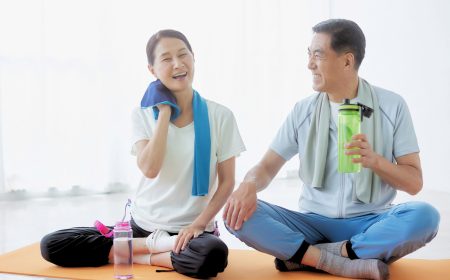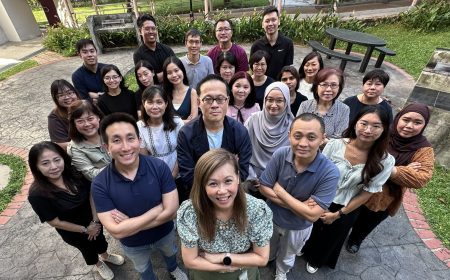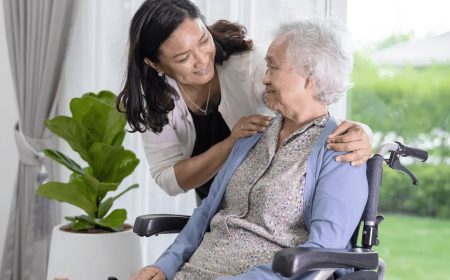86% of elderly residents intend to continue living in their existing HDB flats. And if they were to need help with activities of daily living (ADLs), they felt that the ideal living arrangement would be to stay in their own homes, while having family members or domestic helpers care for them1. These family members or domestic helpers are whom we call ‘caregivers’.
Who are caregivers
Caregivers are those who provide assistance to a person who is ill, disabled or needs help with ADLs. In Singapore, on average, caregivers provide 6.8 hours of care to care recipients per day in a normal week2. The majority of caregivers are between 40-59 years old, married, with 3 out of 4 of them being employed3. This suggests that most caregivers juggle caring for a loved one with work commitments and family responsibilities.
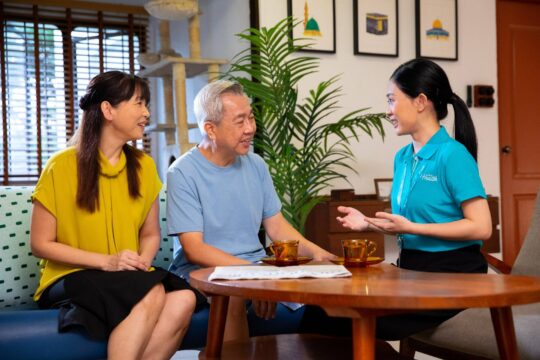
What are caregivers’ roles
Caregivers take care of recipients’ ADLs, medical needs, emotional needs and may even need to make financial and legal decisions on their behalf. A caregiver typically takes care of a care recipient’s4:
| Physical needs | Help the care recipient with getting dressed, toileting and going about household tasks such as buying groceries and chores. |
| Health and medical needs | Check that the care recipient is exercising, eating well, and taking medication as prescribed; supporting them with their medical appointments |
| Emotional and psycho-social needs | Engaging the care recipient through conversation and activities |
| Spiritual needs | Encouraging the care recipient to stay positive such as through his/her practice of religious beliefs. |
| Financial and legal needs | Managing daily expenses, insurance and assets. |
The complexities of these tasks and degree of involvement vary based on the care recipient’s needs.
What is caregiver burnout and its symptoms
It takes more than love and time to be a caregiver, as these tasks demand endless patience, understanding and maybe even sacrificing one’s own career and personal life. Most of the time, caregivers have to juggle caregiving with their other responsibilities.
Caregiving can be demanding mentally, physically and emotionally. Often, caregivers are so busy with their caregiver responsibilities that they may neglect their own health and needs. Caregivers may not get enough sleep and exercise or eat a balanced diet. This increases the caregiver’s risk of medical problems, such as diabetes and hypertension. Caregiver stress or even burnout - a state of physical, emotional and mental exhaustion, can set in if a caregiver does not get the help he or she requires.
There are various signs that point to caregiver stress and burnout. Symptoms of caregiver burnout may include the caregiver:
- becoming unusually impatient, irritable or argumentative with the care recipient and/or others
- feeling overwhelmed and fatigued
- sleeping too much or too little
- experiencing weight loss or gain
- feeling hopeless; lacking motivation to complete tasks
- deriving less interest in his/her favourite activities
Just among caregivers of stroke survivors, 40.2% have depressive symptoms, according to a 2017 study by the Institute of Mental Health and National University of Singapore. While no recent study has been done on other caregivers, this statistic shows that caregivers need to start taking care of themselves, especially if more Singaporeans are to become caregivers to their loved ones5.

How can caregivers take care of themselves
Self-care
Caregivers must take care of themselves to be able to take care of their care recipient. They can:
1. Ask for and accept help
Caregivers could just need a short break from their caregiving duties. They could reach out to a trusted family member or friend who could care for the care recipient once in a while. For example, family and friends could take the care recipient out for a walk a couple of times a week.
2. Join a caregiver support group
NTUC Health's Community Resource Engagement and Support (CREST) team manages a caregiver support group. Caregivers can join CREST team's "Take a Brake" sessions, which are held at Active Ageing Centre (either Henderson, Taman Jurong, or Boon Lay) on a quarterly basis. Sometimes, virtual sessions may also be held. Community resources related to eldercare and caregiving are also shared via a Whatsapp group chat.
During the "Take a Brake" session or in the group chat, caregivers can share their thoughts and feelings, challenges, exchange caregiving tips and receive emotional support in their caregiving journey. For better mental resilience, caregivers can also attend health talks that the team conducts. Caregivers who are interested in such social support can contact NTUC Health from Monday to Friday, 8.30am to 6pm, at 9455 2308 or email crest@ntuchealth.sg
3. Set personal health goals
Some caregivers are so focused on their care recipient’s healthcare needs that they may forget about their own health needs and goals. Setting personal health goals can reduce risk factors for one’s health, boost one’s energy and increase one’s motivation. Here are some examples of health goals which caregivers can set.
Mental health goal: Find time for self-care
“I will set aside at least 45 minutes per day, 5 out of 7 days, to engage in a self-care activity to reduce stress levels."
Self-care activities would include:
- Getting a book from the library about some topic one has been interested in, but has never taken the time to read about. Afterwards, spend a few minutes each day learning about it.
- Take a moment at the end of the day to list down a few good things that have happened in the day or in your life. This can help refocus one’s emotions on all the positive things that happened each day, even when the day did not feel like it was great.
- Listen to music that inspires and motivates
- Write a list of things that one is grateful to have and post it somewhere visible. It will act as a reminder of the good things in life when the going gets tough.
Physical health goal: Exercise more
“I will spend at least 30 minutes per day walking outside while not having my mobile phone on hand.”
It is also advisable to focus on achieving one health goal at a time to ensure a higher level of commitment and success.
Respite Care Services
Apart from exercising self-care, to avoid caregiver burnout, it is always a good idea to seek external help early. First, caregivers can think of the help their loved one needs. Then they can consider the various respite care options based on the amount of time they would be away. Additionally, if the loved one has trouble with changes in routines, the respite care caregiver could visit while the caregiver is present. The caregiver could provide guidance while the loved one familiarises with the respite care caregiver.
NTUC Health’s Respite Care services are designed to offer caregivers a breather so that they can take some time off to manage their own needs and focus on themselves. Read on to find out what options are available!
Home Care
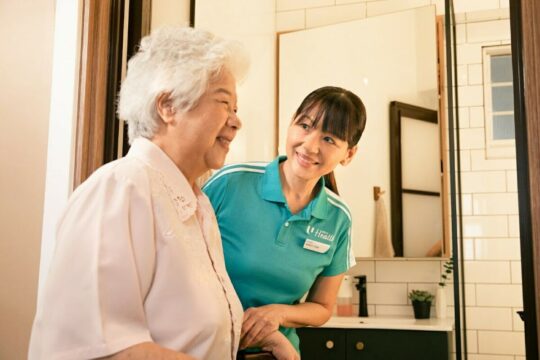
Caregivers may need a few hours away from home to run errands or attend important events like their own medical appointments while their care recipient remains in the comfort of their home. NTUC Health’s Home Care team can help the care recipient with home personal care services. Care Associates can visit and support the care recipient with activities of daily living (ADLs), companionship and exercise while the caregiver steps out for a while.
Senior Day Care
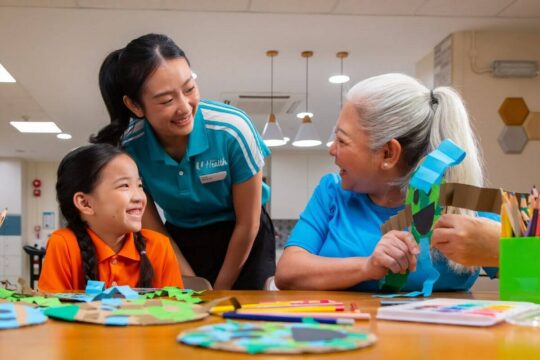
There can be occasions when the caregiver needs to be away from home for more than a few hours. Perhaps the caregiver has social activities or courses to attend. Caregivers can enrol their loved ones in one of the 26 NTUC Health Day Centre for Seniors located islandwide. Care recipients can join in the exercises and programmes designed to maintain their physical and cognitive function, for a day or even a few days a week.
Other flexible care arrangements, such as Fun with Friends, a 3-hour programme specially designed for seniors with mild dementia, or a home-based online DayCare+ programme are also available to keep care recipients engaged and active while caregivers get the respite they need.
Care on Sundays programme where seniors can enjoy activities at selected Day Centre for Seniors can also be considered if caregivers need respite on Sundays, or when their domestic helpers are on their days off. Seniors can enjoy activities like arts and crafts, karaoke, and music and reminiscence therapy.
Nursing Home
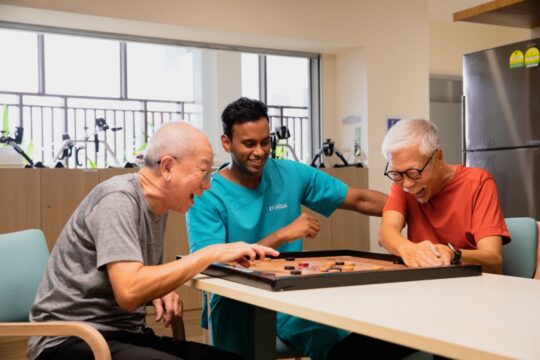
There will be times when family members need to be overseas or domestic helpers go on home leave. For seniors who require assistance in most ADLs and have high nursing care needs where support is needed at night, caregivers can consider our nursing homes. At our nursing homes, seniors who are bedbound or require round-the-clock assistance can receive the care they need. We provide both government-subsidised care as well as private respite care services. Caregivers who are interested in private respite care may register your interest here.
Contact Us
Get in touch to find out how we can help by dropping us a note here!
Have a question or wish to enrol?
Sources
1 Lin, C. (2021). Growing preference among elderly residents to 'age in place': HDB survey. https://www.channelnewsasia.com/singapore/elderly-hdb-ageing-assisted-living-sample-household-survey-341871
2 Zheng, Z. (2011). Caregiving in Singapore. https://www.singstat.gov.sg/-/media/files/publications/society/ssnsep11-pg12-14.pdf
3 Zheng, Z. (2011). Caregiving in Singapore. https://www.singstat.gov.sg/-/media/files/publications/society/ssnsep11-pg12-14.pdf
4 AIC. (2022). Roles of a caregiver. https://www.aic.sg/caregiving/caregiver-role
5 Maier, A. B. (2022). Commentary: Why S'poreans need to bone up on muscle wellness, as more become caregivers to loved ones. https://www.todayonline.com/commentary/commentary-why-sporeans-need-bone-muscle-wellness-more-become-caregivers-loved-ones-1959126
